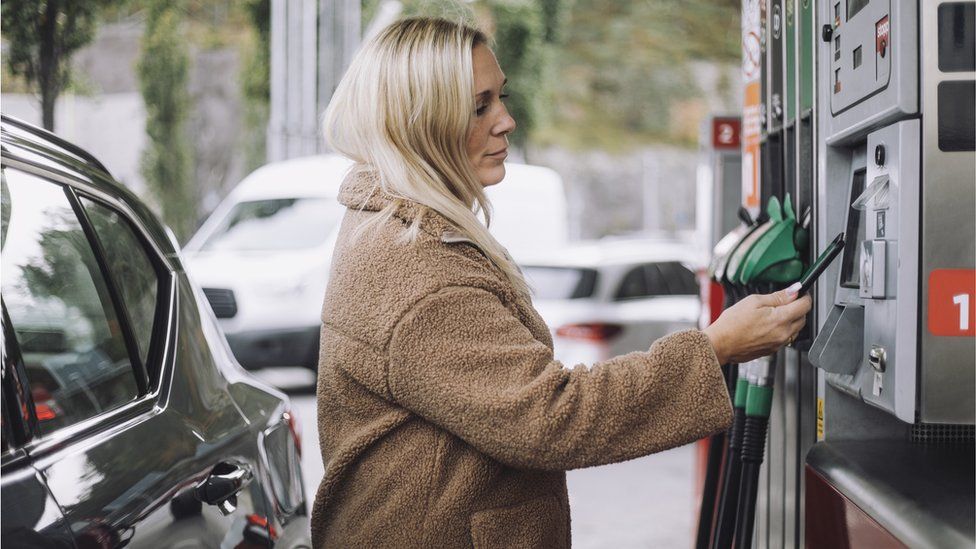Petrol prices fall to lowest level in two years
- Published

Petrol prices have fallen to lowest level at the pumps on average for more than two years, the RAC has said.
A litre of unleaded costs about £1.43 on average, a price which was last seen at UK forecourts in October 2021.
A fall in wholesale fuel costs has resulted in lower pump prices, the RAC said, adding that petrol could fall below £1.40 in the next week.
The drop also comes after the UK competition watchdog warned that drivers were not getting a fair deal.
The Competition and Markets Authority (CMA) said last month that retail prices for petrol and diesel had not fallen in step with wholesale costs, adding that there was "cause for concern" competition in the fuel market was not working.
The RAC, which has criticised supermarkets and petrol retailers over pricing, said petrol falling to £1.43 on average - about 10p cheaper than this time last year - was "good news for drivers, especially as prices should continue to come down in the run-up to Christmas due to the wholesale price being significantly lower".
"While the biggest retailers haven't announced any headline-grabbing big cuts, prices are falling steadily every day which is encouraging. We just have to hope this continues in the coming days," said Simon Williams, the motoring group's fuel spokesman.
He added while diesel was not as lower at around £1.50 on average, it was "still down from last Christmas' dizzying prices of around £1.75 a litre".
Drivers have been stung by higher fuel prices in recent years.
The cost of filling up began rising as demand increased when coronavirus lockdowns were eased, and jumped further after Russia invaded Ukraine last year. Fears over oil global supplies saw the price of a barrel of Brent crude, a key ingredient in motor fuel, to hit more than $120 in June 2022.
That in turn drove pump prices, which peaked in July at a record £1.92p a litre for petrol and £1.99 for diesel.
While oil prices fell back from the peak, fuel prices also dropped, but concerns were raised that supermarkets, typically the cheapest fuel retailers, and other forecourts were not passing on the lower wholesale prices to customers.
An investigation in July found Britons were found to have paid an extra 6p per litre for fuel at supermarkets last year as weak competition let them charge more. The fallout led to retailers agreeing to set up a scheme to allow motorists to compare live fuel prices online.
In recent months, concern over fuel prices returned as petrol rose for four months in a row. This came as oil prices increased again after major oil producers, such as Saudi Arabia and Russia, decided to restrict production.
On Friday, Brent crude was around $77 a barrel and the RAC's Mr Williams said if wholesale prices "are reflected more fairly at the pumps" in the next next week "we should see the average price of petrol drop below 140p [per litre]".
How to save money on petrol and diesel
- Watch your speed: The RAC says 45-50mph is the most efficient speed to drive for fuel efficiency
- Switch off the air conditioning: Extra energy is needed to power a car's air conditioning system and turning it on can increase your fuel consumption by up to 10%, according to the AA
- Check your tyre pressure: Underinflated tyres will use up extra petrol. Check your pressures regularly, especially before heading off on a long journey
Related Topics
- Published4 October 2023